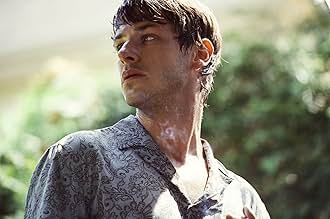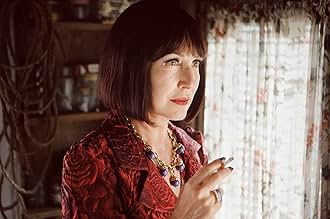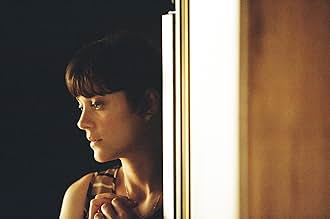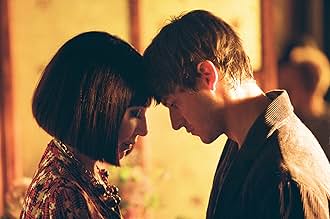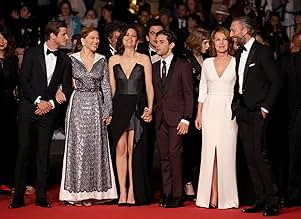AVALIAÇÃO DA IMDb
6,8/10
26 mil
SUA AVALIAÇÃO
Louis, um escritor com doença terminal, volta para casa após uma longa ausência para contar à família que está morrendo.Louis, um escritor com doença terminal, volta para casa após uma longa ausência para contar à família que está morrendo.Louis, um escritor com doença terminal, volta para casa após uma longa ausência para contar à família que está morrendo.
- Direção
- Roteiristas
- Artistas
- Prêmios
- 19 vitórias e 39 indicações no total
Antoine DesRochers
- Pierre Jolicoeur
- (as Antoine Desrochers)
- Direção
- Roteiristas
- Elenco e equipe completos
- Produção, bilheteria e muito mais no IMDbPro
Avaliações em destaque
The story is familiar. because the portrait of dysfunctional family is not rare in the cinema of last decades. but the film has a fundamental virtue - it is a Xavier Dolan work. and that change everything. because not the conflicts, vulnerabilities, isolation, angry and fears, the return of the son are the basic aspects. but the precise and not comfortable image of loneliness. using admirable cinematography. the right actors. the close up. the forceof silence. the small gestures and shadows of memories. the admirable cold dialogues. and the last part as ideal building for a search who becomes out of target. a film who impress. not only for artistic value. but for remarkable science to present the things who are out of us being inside us. frustrations, intentions, the desire to be far by the other who could represent only the stranger. who is just an accident. so, a beautiful Xavier Dolan.
b.r.i.l.l.i.a.n.t! I saw this movie at TIFF on Sept. 17 and it was the first Dolan film I've seen. It deserves the award it received at Cannes! Despite all the shouting and intensity, this film conveys with subtlety, suggestive dialogue and glances, the range of emotions felt by different members of a family when there has been an unexplained loss of another family member. Even though the main character, Louis, is still alive and returns to the family, they react as if he has returned from an unexpected death. They range from guilt, rage, idealization, and denial.The close-up filming style also reveals each family member's pain in intimate detail. Dolan is brilliant in his interpretation of that family's deep pain and Louis's coming to terms with not only his own impending death but the "death" the family already has had to deal with when he went away the first time.
I read Jean-Luc Lagarce's play "Juste la fin du monde" a while back and it didn't really make an impression on me. So I was quite intrigued and just a tiny bit worried when I learned that Xavier Dolan, possibly my favorite contemporary film director, was adapting this to me impenetrable text into a movie.
I had confidence in Dolan's genius and was rewarded beyond expectations. The film is as magnificent as anything Dolan has created before. He has said in interviews that at first reading Lagarce's language- also off-putting for me- didn't impress him but that he discovered its power on second random reading. I'm grateful he did and that he has now shared this discovery with his audience with the aid of some truly superb acting performances.
The very first scene establishes everything with narration by protagonist Louis (Gaspard Ulliel), a successful author who is flying to see his family for the first time in over a decade. Louis is dying. Dolan hides Ulliel's face with shadowy lightning and a cap as well as utilizes close-ups so extreme you can't get a proper feel of a face. The close focus continues in the following scenes of Louis's family, only to very gradually move away as the film progresses.
Greeting Louis are his extravagant mother Martine (Nathalie Baye), his coolly detached younger sister Suzanne (Léa Seydoux), his dominant yet socially awkward older brother Antoine (Vincent Cassel) as well as Antoine's shy, even more socially awkward wife Catherine (Marion Cotillard).
Dolan tends to depict extreme personal conflict in his work, uniting his fiercely dramatic, richly colored and always unique visuals with raw scripts that seem to channel Ingmar Bergman's best work. This also occurs in "Juste la fin du monde".
If you looked at the movie without sound you could mistake it for a regular- if exceptionally well shot and acted- drama about a family uniting with the result of old wounds and conflicts emerging and taking over the scenes. This is indeed what basically happens here, but the dialog, to me so difficult to digest from the pages of a book, makes it all about what is left unsaid. Because even as extreme emotion takes over the characters and bursts out they still can't communicate with each other. Lines that one would expect to convey full, sincere, angry honesty are expressed through awkward, even incomprehensible dialog that only hints at the apparently troubled history of these people.
Louis, as mellow and conciliatory as he acts, seems to be a dangerous catalyst for his family, an antigen they all defend their nest against. This is endlessly fascinating and sold so well by the actors, each and every one of them marvelous. The title becomes darkly ironic, as Louis soon seems to find his impending death a minor problem in his severely dysfunctional family. He connects with Catherine, another outsider and someone who he hasn't met before this one day during which the whole film occurs. "How much time?" Catherine asks Louis, a question that together with the offhand mention of Louis's first boyfriend having passed away from "cancer" establishes the fatal backdrop of the AIDS epidemic.
At first glance "Juste la fin du monde" might seem like a melodramatic shouting match that emerges unfocused and aimless, but I ultimately find it urgently compelling and even insightful through its sustained aversion to a genuine unmasking of characters.
Lagarce wrote the original play in 1990, reportedly to examine his own mortality. He was dying himself at that time and finally succumbed to AIDS in 1994. There is a touching dimension to the script's nightmarish reunion as we sense Louis's need to come full circle, to rediscover his childhood and adolescence, even to assure himself that his already estranged family can survive after he's gone. Death is ever present, and instead of trivializing the personal conflicts it elevates them, because they are if nothing else moments of vitality for people not truly living.
I had confidence in Dolan's genius and was rewarded beyond expectations. The film is as magnificent as anything Dolan has created before. He has said in interviews that at first reading Lagarce's language- also off-putting for me- didn't impress him but that he discovered its power on second random reading. I'm grateful he did and that he has now shared this discovery with his audience with the aid of some truly superb acting performances.
The very first scene establishes everything with narration by protagonist Louis (Gaspard Ulliel), a successful author who is flying to see his family for the first time in over a decade. Louis is dying. Dolan hides Ulliel's face with shadowy lightning and a cap as well as utilizes close-ups so extreme you can't get a proper feel of a face. The close focus continues in the following scenes of Louis's family, only to very gradually move away as the film progresses.
Greeting Louis are his extravagant mother Martine (Nathalie Baye), his coolly detached younger sister Suzanne (Léa Seydoux), his dominant yet socially awkward older brother Antoine (Vincent Cassel) as well as Antoine's shy, even more socially awkward wife Catherine (Marion Cotillard).
Dolan tends to depict extreme personal conflict in his work, uniting his fiercely dramatic, richly colored and always unique visuals with raw scripts that seem to channel Ingmar Bergman's best work. This also occurs in "Juste la fin du monde".
If you looked at the movie without sound you could mistake it for a regular- if exceptionally well shot and acted- drama about a family uniting with the result of old wounds and conflicts emerging and taking over the scenes. This is indeed what basically happens here, but the dialog, to me so difficult to digest from the pages of a book, makes it all about what is left unsaid. Because even as extreme emotion takes over the characters and bursts out they still can't communicate with each other. Lines that one would expect to convey full, sincere, angry honesty are expressed through awkward, even incomprehensible dialog that only hints at the apparently troubled history of these people.
Louis, as mellow and conciliatory as he acts, seems to be a dangerous catalyst for his family, an antigen they all defend their nest against. This is endlessly fascinating and sold so well by the actors, each and every one of them marvelous. The title becomes darkly ironic, as Louis soon seems to find his impending death a minor problem in his severely dysfunctional family. He connects with Catherine, another outsider and someone who he hasn't met before this one day during which the whole film occurs. "How much time?" Catherine asks Louis, a question that together with the offhand mention of Louis's first boyfriend having passed away from "cancer" establishes the fatal backdrop of the AIDS epidemic.
At first glance "Juste la fin du monde" might seem like a melodramatic shouting match that emerges unfocused and aimless, but I ultimately find it urgently compelling and even insightful through its sustained aversion to a genuine unmasking of characters.
Lagarce wrote the original play in 1990, reportedly to examine his own mortality. He was dying himself at that time and finally succumbed to AIDS in 1994. There is a touching dimension to the script's nightmarish reunion as we sense Louis's need to come full circle, to rediscover his childhood and adolescence, even to assure himself that his already estranged family can survive after he's gone. Death is ever present, and instead of trivializing the personal conflicts it elevates them, because they are if nothing else moments of vitality for people not truly living.
Critics shouldn't be criticizing films they don't understand. Xavier Dolan's movies are extremely subtle in their acting and dialogues which I think makes it more difficult for non-French speakers to understand. This is especially true for this film since the movie is based upon the impossibility to communicate. That's probably why most of the bad reviews come from American newspapers. I mean, I'm French and I honestly admire non-French speaking fans of Dolan because subtitles aren't enough to communicate the subtlety of each word and tone. Aside from that it's only a matter of taste.
I agree on the fact that some characters are a bit stereotyped, especially during the scenes in which the whole family is gathered. However each actor has a scene in which they speak in private with Louis and that's when their characters get interesting. The film is aesthetically brilliant and allows you to understand things only eyes can communicate. The movie constantly creates an emotional tension, something I've rarely felt.
I agree on the fact that some characters are a bit stereotyped, especially during the scenes in which the whole family is gathered. However each actor has a scene in which they speak in private with Louis and that's when their characters get interesting. The film is aesthetically brilliant and allows you to understand things only eyes can communicate. The movie constantly creates an emotional tension, something I've rarely felt.
I've read some negatives review for this film and disagree completely with all of them. It's a brilliant film centered around dysfunctional family dynamics, with all the associated emotions and behavior. Yes, there is yelling. Yes, there is tension. Yes, there are close-ups and moments of silence. And they all converge into a very deep and touching story (which was the whole purpose!!!)
The cast was perfect. The music was perfect. The images were perfect.
Xavier Dolan is a genius. He was inspired by the play "Juste la fin du monde" but turned it into something completely different. It's not a Hollywood story, please keep that in mind. This is the kind of movie that challenges you (and that only adds to its value).
The cast was perfect. The music was perfect. The images were perfect.
Xavier Dolan is a genius. He was inspired by the play "Juste la fin du monde" but turned it into something completely different. It's not a Hollywood story, please keep that in mind. This is the kind of movie that challenges you (and that only adds to its value).
Você sabia?
- CuriosidadesFirst film directed by Xavier Dolan with only French actors in the cast. His previous films were all starred by Canadian actors. This film, however, was shot entirely in Canada.
- Citações
Antoine Knipper: We think silent people are good listeners. But I shut up so people leave me alone.
- ConexõesFeatured in Xavier Dolan: à l'impossible je suis tenu (2016)
- Trilhas sonorasHome Is Where It Hurts
Written by Camille, Dominique Dalcan, Matthew Ker
Performed by Camille
Published by Blonde Music and Balulalo
Authorized by Warner Music Canada for Parlophone Music France
Principais escolhas
Faça login para avaliar e ver a lista de recomendações personalizadas
- How long is It's Only the End of the World?Fornecido pela Alexa
Detalhes
- Data de lançamento
- Países de origem
- Centrais de atendimento oficiais
- Idiomas
- Também conhecido como
- It's Only the End of the World
- Locações de filme
- Sainte-Dorothée, Laval, Québec, Canadá(house interiors)
- Empresas de produção
- Consulte mais créditos da empresa na IMDbPro
Bilheteria
- Orçamento
- € 6.900.000 (estimativa)
- Faturamento bruto mundial
- US$ 9.231.823
- Tempo de duração
- 1 h 37 min(97 min)
- Cor
- Mixagem de som
- Proporção
- 1.85 : 1
Contribua para esta página
Sugerir uma alteração ou adicionar conteúdo ausente

![Assistir a Bande-annonce [OV]](https://m.media-amazon.com/images/M/MV5BOWE2Nzg5NjctOWNhNi00MTEwLWIzOTMtOWQ2MWY1YjM5Y2JjXkEyXkFqcGdeQXRyYW5zY29kZS13b3JrZmxvdw@@._V1_QL75_UX500_CR0)
![Bande-annonce [OV]](https://m.media-amazon.com/images/M/MV5BOTExZGFjM2MtMTFhZC00Y2E3LWJiZGEtNzU4ODlhOGRhZDc0XkEyXkFqcGdeQXRyYW5zY29kZS13b3JrZmxvdw@@._V1_QL75_UX500_CR0)


